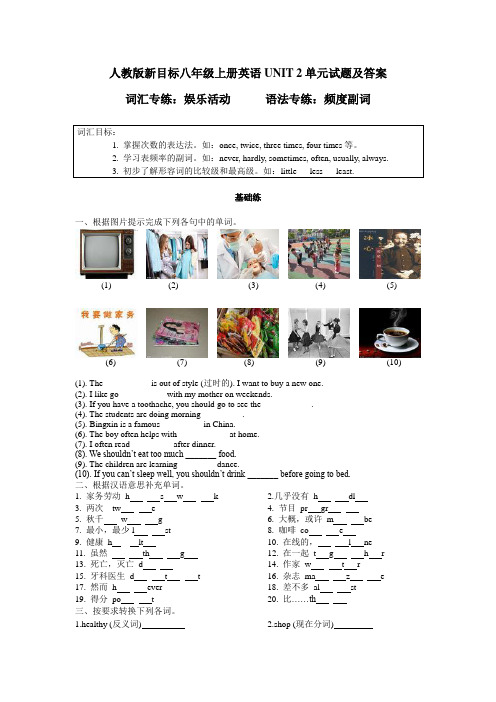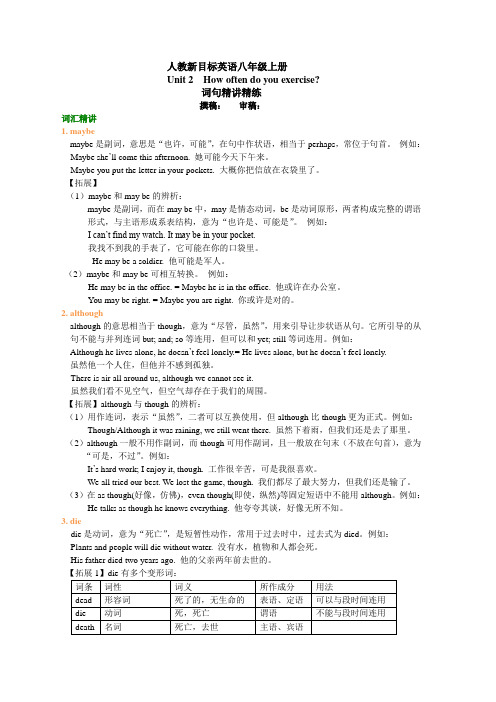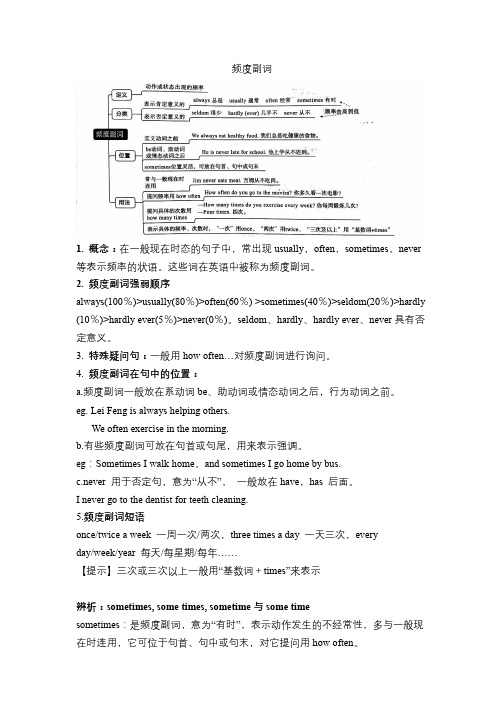人教新目标八年级上Unit2频度副词精讲专练
英语人教新目标八年级上册Unit 2 How often do you exercise? Section A-频度副词

√ √ √ × × ×
√ √ × × √ ×
√ √ √ × × ×
√ √ × × × ×
√ × √ × ×
经常 × usually 常常 often
有时 sometimes
很少 seldom
从不 never
替换练习:Mary always takes a bus to school.
频度副词
这类词用来表示某一动作发生的频率,或某一状 态出现的频率,即在一定的时间内动作重复发生 或状态重复出现的次数。
Section A
grammar
Unit 2 How often do you exercise?
频度副词
★always
• always 意为“总是”,与进行时态连用 时,可以表示赞扬,也可以表示讨厌 等感情色彩。e.g. • (1)I shall always remember my fir st day at school. 我将永远记住我上 学的第一天。 • (2)He is always smoking. 他总是 抽烟。
类似every day,every weekevery Saturday或on saturdays 等等这样的频度副词短语通常放在句末,也可以放在句首。
Translate the phrases below:
一天一次 once a day 一月一次 once a month 一天五次 once two days 一天两次 twice a day 一年一次 once a year 一周两次 twice a week 一 周三次 three times a week 一年四次 four times a year 一年六次 six times a year
I
人教版新目标八年级上册英语UNIT 2单元试题及答案

人教版新目标八年级上册英语UNIT 2单元试题及答案词汇专练:娱乐活动语法专练:频度副词基础练一、根据图片提示完成下列各句中的单词。
(1) (2) (3) (4) (5)(6) (7) (8) (9) (10)(1). The __________ is out of style (过时的). I want to buy a new one.(2). I like go __________ with my mother on weekends.(3). If you have a toothache, you should go to see the ___________.(4). The students are doing morning _________.(5). Bingxin is a famous _________ in China.(6). The boy often helps with ___________ at home.(7). I often read _________ after dinner.(8). We shouldn’t eat too much _______ food.(9). The children are learning ________ dance.(10). If you can’t sleep well, you shouldn’t drink _______ before going to bed.二、根据汉语意思补充单词。
1. 家务劳动h s w k2.几乎没有h dl3. 两次tw e4. 节目pr gr5. 秋千w g6. 大概,或许m be7. 最小,最少l st 8. 咖啡co e9. 健康h lt 10. 在线的,l ne11. 虽然th g 12. 在一起t g h r 13. 死亡,灭亡d 14. 作家w t r15. 牙科医生d t t 16. 杂志ma z e 17. 然而h ever 18. 差不多al st19. 得分po t 20. 比……th三、按要求转换下列各词。
八年级英语上册Unit2Howoftendoyouexercise第3课时同步语法精讲精练人教新目标版

一、根据句意,选择方框中的单词或短语填空。 always,hardly ever,never,usually,sometimes 1.I can't swim,so I ______ go to the river to swim. never 2.—Do you go shopping in the supermarket all the time?
eg:Arthur goes to visit his grandpa once a week.阿瑟每周去看望他爷爷一 次。 I wash my hair three times a week.我一星期洗三次头发。
②不表示具体频度 英语中还有一些频度副词不表示具体的频率、次数,但有特殊意义,如 always(总是),usually(通常),(经常),sometimes(有时),seldom(很 少),hardly ever(几乎不),never(从来不)等。
—Yes,I _______ go shopping there. always
sometimes 3.Alen likes writing to me,but ___________ he calls me up. hardly ever 4.It ___________ rains in the desert (沙漠).It's usually sunny and warm. 5 . My brother ________ goes to the movies on weekends , but he usually sometimes goes to the movies on Fridays.
8.有时我在星期日打扫卫生。
_________ ,I __ _____ ________ on Sunday. Sometimes do some cleaning
人教版英语八年级上册unit2-频度副词用法专练

Unit2 频度副词用法专练单项选择uall.___.t.work.A.driveB.drivesC.droveD.i.driving2.—___.d.yo.g.t.th.movies?—Hardly ever.A.Ho.oftenB.Ho.oldC.Ho.manyD.Ho.much3.—Ms.Li.i.ver.popula.amon.th.students.—Yes.He.classe.ar.___.lively(生动的.an.interesting.A.alwaysB.sometime.C.hardl.D.never4.Englis.peopl.___.us.“Mr..befor..man’.A.neveruall.C.ofte.D.hardly5.—D.yo.ofte.g.fishin.wit.you.father?—No.____..don’.lik.fishin.a.all.A.neverB.alwaysuallyD.often6.Spea.aloud.please..ca.___.hea.you.uall.B.almos.C.hardl.D.nearl.7.—___.d.yo.writ.t.you.pe.friend?—Once a week.A.Ho.lon.B.Ho.soo.C.Ho.fa.D.Ho.ofte.8.H.___.lat.fo.school.A.i.ofte..B.ofte.i.C.doe.ofte..D.ofte.does9.Zhan.Ha.___in.th.Internet.A.har.eve..B.hardl.eve.C.doesn’.har.everD.doesn’.hardl.eve.10.H.hardl.doe.hi.homewor.a.home.____?A.i.h..B.isn’.h..C.doe.h..D.doesn’.h.参考答案及解析1.. usually意为“通常”, 是表示频率的副词, 常用于一般现在时。
人教新目标英语八年级上册Unit2知识讲解+练习题(含答案)

人教新目标英语八年级上册Unit 2 How often do you exercise?词句精讲精练撰稿:审稿:词汇精讲1. maybemaybe是副词,意思是“也许,可能”,在句中作状语,相当于perhaps,常位于句首。
例如:Maybe she’ll come this afternoon. 她可能今天下午来。
Maybe you put the letter in your pockets. 大概你把信放在衣袋里了。
【拓展】(1)maybe和may be的辨析:maybe是副词,而在may be中,may是情态动词,be是动词原形,两者构成完整的谓语形式,与主语形成系表结构,意为“也许是、可能是”。
例如:I can’t find my watch. It may be in your pocket.我找不到我的手表了,它可能在你的口袋里。
He may be a soldier. 他可能是军人。
(2)maybe和may be可相互转换。
例如:He may be in the office. = Maybe he is in the office. 他或许在办公室。
You may be right. = Maybe you are right. 你或许是对的。
2. althoughalthough的意思相当于though,意为“尽管,虽然”,用来引导让步状语从句。
它所引导的从句不能与并列连词but; and; so等连用,但可以和yet; still等词连用。
例如:Although he lives alone, he doesn’t feel lonely.= He lives alone, but he doesn’t feel lonely.虽然他一个人住,但他并不感到孤独。
There is air all around us, although we cannot see it.虽然我们看不见空气,但空气却存在于我们的周围。
新目标八年级上册:Unit 2 频度副词

频度副词辅导(附答案)频度副词表示事情发生的频率。
常见的频度副词有always, sometimes, hardly ever, usually, often, never等。
*常见的频度副词的频率大小如图所示:* 频度副词的位置: 频度副词通常放在实义动词之前,系动词、助动词或情态动词之后,但有些频度副词如sometimes,often等位置比较灵活,还可以放在句首或句尾。
如:David usually gets home at about this time.My sister doesn't always read in the library.(注意:always 与not连用,表示部分否定,意为“并非总是”。
若要表示全部否定,应用never。
)My father sometimes / often works at the weekend.Sometimes / Often my father works at the weekend.My father works at the weekend sometimes / often.* 当对频度副词及表示事件发生频率的短语提问时,常用how often,意为“多久一次”。
如:·Bill never goes to the cinema. (对划线部分提问)→How often does Bill go to the cinema?·I wash my clothes three times a week. (对划线部分提问)→How often do you wash your clothes?Ⅰ.单项选择1. —_______ do you brush your teeth?—Twice or more a day.A. How soonB. How farC. How longD. How often (2018 辽宁沈阳)2. Mary _______ rides a bike to school, because she enjoys taking a bus.A. alwaysB. oftenC. neverD. usually3. —What do you think of Mr. White?—He is very kind. He _______ tries his best to help people.A. alwaysB. neverC. sometimes4. Lisa and her parents like football very much. They _______ watch football games.A. sometimesB. oftenC. never5. —What do you _______ do after you get up in the morning?—I take a shower and then have my breakfast at home.A. usuallyB. neverC. sometimesⅡ.对划线部分提问1. I sometimes go fishing with my grandpa._______ _______ _______ you _______ fishing with your grandpa?2. John hardly ever eats junk food._______ _______ _______ John _______ junk food?3. Cathy has dance lessons twice a week._______ _______ _______ Cathy _______ dance lessons?4. They use the WeChat every day._______ _______ _______ they _______ the WeChat?Ⅲ.连词成句要求:①使用一般现在时;②将频度副词(often, never, always, sometimes, usually, hardly ever)按照频率从高到低的顺序依次放入以下6个小题中。
Unit 2 频度副词用法专项人教版英语八年级上册

频度副词1. 概念:在一般现在时态的句子中,常出现usually,often,sometimes,never 等表示频率的状语。
这些词在英语中被称为频度副词。
2. 频度副词强弱顺序always(100%)>usually(80%)>often(60%) >sometimes(40%)>seldom(20%)>hardly (10%)>hardly ever(5%)>never(0%)。
seldom、hardly、hardly ever、never具有否定意义。
3. 特殊疑问句:一般用how often…对频度副词进行询问。
4. 频度副词在句中的位置:a.频度副词一般放在系动词be、助动词或情态动词之后,行为动词之前。
eg. Lei Feng is always helping others.We often exercise in the morning.b.有些频度副词可放在句首或句尾,用来表示强调。
eg:Sometimes I walk home,and sometimes I go home by bus.c.never 用于否定句,意为“从不”,一般放在have,has 后面。
I never go to the dentist for teeth cleaning.5.频度副词短语once/twice a week 一周一次/两次,three times a day 一天三次,everyday/week/year 每天/每星期/每年……【提示】三次或三次以上一般用“基数词+times”来表示辨析:sometimes, some times, sometime与some timesometimes:是频度副词,意为“有时”,表示动作发生的不经常性,多与一般现在时连用,它可位于句首、句中或句末,对它提问用how often。
some times是名词短语,意为“几次;几倍”,其中time是可数名词,对它提问用how many times。
人教版八年级英语上册Unit2 频度副词用法专练(含答案)

人教版八年级英语上册Unit2 频度副词用法专练一、单项选择题( )1.—How often do you usually go to work by subway?—_________. I always take a bus, because there is no subway in this city.A SometimesB OftenC NeverD Seldom( )2.“Left behind”children_________ see their parents, because their parents work in the cities, leaving them behind in the countryside to be cared for by their grandparents.A alwaysB hardly everC oftenD sometimes( )3.—_________ do you exercise, Tony?—Three times a week.A How oftenB How soonC How longD How much( )4.My father usually________ to work.A driveB drivesC droveD is driving( )5.—________ does your father play sports?—Twice a week.A How soonB How oftenC How longD How old( )6.—Ms. Lin is very popular among the students.—Yes. Her classes are________ lively(生动的)and interesting.A alwaysB sometimesC hardlyD never( )7.My father doesn’t like hamburgers, so he________ eats them.A alwaysB usuallyC oftenD hardly( )8.—Do you often go fishing with your father?—No, ________. I don’t like fishing at all.A neverB alwaysC usuallyD often( )9.Everyone in our neighborhood loves my grandma because she is ________ kind to others.A neverB alwaysC seldomD sometimes( )10.—How was your trip to the British Museum?—I could __________ speak English and was completely silent during the visit.A hardlyB alwaysC usuallyD often( )11.You can bravely tell others what you think if you have different ideas. But __________ remember to choose the proper way.A neverB seldomC alwaysD often( )12.Tina __________ drives to work. But today she drives because of the rain.A alwaysB oftenC sometimesD hardly( )13.—How often do you go to the cinema?—__________. I only watch movies at home.A AlwaysB UsuallyC SometimesD Never( )14.— ________do you go to see your grandparents, Frank?—Once a week.A How soonB How oftenC How long D.How old ( )15.—Do you know the woman in red?— ________she is our new Chinese teacher.A MaybeB LuckilyC SlowlyD Quickly( )16.—My favorite TV________is A Bite of China(《舌尖上的中国》).—I like it, too. My mother often cooks delicious food after watching it.A informationB newsC screenD program( )17.This weekend is_______ for me .I have to help my mum______housework and I also have much homework.A free; doB interesting; to doC full; withD fun; with( )18._______ my grandpa is over 80 years old,he still looks strong and healthy.A AlthoughB BecauseC UnlessD If( )19.—Look ,there is a cute bird, Mom.—It flew into our kitchen__________the window just now, Alex.A acrossB throughC aboveD under( )20.—I tried several ways to work out the math problem, but______of them worked.—Never give up. I believe you’ll make it.A allB eachC noneD neither( )21.Mo Yan is an excellent_____and he won the Nobel Prize in literature in 2012. We Chinese all take pride in him.A traderB writerC dentistD teacher( )22.Lots of students in my class are good at running,________Bill and Mike.A such asB because ofC at leastD go along( )23.—Would you like something to drink? —Yes,______ please.A some meatB some cakesC some dumplingsD some coffee二、补全句子1.—Were you often late for school last term, Paul?—No, _________. I go to school early every day.2.—How often do you play tennis?—I_________ play it. I’m not interested in it.3.Miss Gao is very popular with her students, because her classes are_________ interesting.4.Linda enjoys reading very much, and she_________ goes to the school library.5.James likes to play sports. He_________ plays them with his friends.参考答案一、CBABB ADABA CDDBA DCABC BAD二、never hardly always often usually(答案不唯一)。
- 1、下载文档前请自行甄别文档内容的完整性,平台不提供额外的编辑、内容补充、找答案等附加服务。
- 2、"仅部分预览"的文档,不可在线预览部分如存在完整性等问题,可反馈申请退款(可完整预览的文档不适用该条件!)。
- 3、如文档侵犯您的权益,请联系客服反馈,我们会尽快为您处理(人工客服工作时间:9:00-18:30)。
Unit2频度副词精讲专练用来表示动作频率的词被称为“频度副词”,例如:usually/sometimes/always/等,这些词在程度上有区别。
是用来表示动作频率的,即在一定的时间内动作重复发生或状态重复出现的次数。
一、按频率大小排列顺序如下:always(100%)>usually(80%)>often(60%)>sometimes(40%)>seldom (20%)>hardly(5%)>rarely never(0%)二、频度副词的位置1. 在be动词之后。
如:She is sometimes very busy. 她有时很忙。
2. 在第一个动词或情态动词之后。
如:I will never forget the first time I met you. 我将永远忘不了和你的第一次见面。
3. 在实义动词之前。
如:We often go there. 我们常去那儿。
4. sometimes也可放在句首、句中或句末,often也可放在句末。
如:Sometimes she writes to me. 她有时候给我写信。
She writes to me often. 她经常给我写信。
三、用法1. often, always, usually等通常和一般现在时连用,表示现在经常或反复发生的动作。
如:It often rains here in April. 这儿四月份常下雨。
2. always与进行时连用时,并不强调动作正在进行,而是表示赞叹、厌烦等情绪。
如:He is always thinking of others. 他总是想着别人。
(赞叹)She is always asking silly questions. 她老是问些愚蠢的问题。
(厌烦)3. 对这些频度副词提问时,用how often。
如:I write to my brother sometimes.How often do you write to your brother?四、频度副词的意义:1、always 意为“总是”,“一直”,它所表示的频度最高,相当于all the time。
如:Tom is always late for school. 汤姆上学总迟到。
2、usually意为“通常”,在一般情况下做某事很少有例外的意思,倾向于一种习惯。
如:We usually go shopping on Sundays. 我们周日通常去购物。
3、often 意为“经常”,它表示的频度不及usually,用来表示动作重复,中间有间断。
如:We often have supper at home. 我们经常在家吃晚饭。
4、sometimes 意为“有时”,它所表示的频度在以上这几个词中最低,它可以放在句子中间,也可以放在句首或句末。
如:She sometimes walks along the river. 她有时候沿着河边散步。
Some times I don’t like to work, because I feel too tired. 有时候我不想去工作,因为我感到太累了。
另外,还有hardly ever和never两个表频度的副词。
5、hardly ever 意为“几乎不”,如:She hardly ever watches TV. 她几乎不怎么看电视。
6、never 所表示频度最低,它所表示的是否定意义,意为“根本不,从未”。
如:He has never been to Beijing. 他从未去过北京。
五、频度副词在否定句中的用法在否定句中,有的频度副词位于否定词之前或之后均可,而有的频度副词则必须位于否定词之后,而还有的频度副词却必须要位于否定词。
大致情况如下:1. 频度副词usually和often可位于否定词not之前或之后。
如:他们不常开这样的晚会。
正:They don’t often hold such parties.正:They often don’t hold such parties.星期日我们一般不在9点以前起床。
正:We don’t usually get u p before nine on Sundays.正:We usually don’t get up before nine on Sundays.在否定句中,频度副词用于句中或句首,有时但会导致意思不同。
如:He doesn’t usually sleep for two days at a time. 他很少一连睡两天。
Usually he doesn’t sleep for two days at a time. 他连续两天不睡觉是常事。
2. 频度副词always总是位于否定词之后,不可位于否定句之前。
如:Things are not always what they seem to be. 外表往往是靠不住的。
Silence must not always be read as consent. 沉默并不见得一定意味着同意。
We thoroughly understand each other, even if we don’t always agree. 我们彼此非常了解,虽然有时候也有一些分歧。
3. 频度副词sometimes总是位于否定词之前,不可位于否定词之后。
如:Jim is sometimes not very punctual. 吉姆有时不太准时。
He is sometimes not satisfied with my work. 他有时对我的工作不满意。
Debbie is sometimes not responsible for what she does. 戴比有时对她所做的事不负责任。
同步专练单项选择1. My father usually ____ to work.A. driveB. drivesC. droveD. is driving2. —____ do you go to the movies?—Hardly ever.A. How oftenB. How oldC. How manyD. How much3. —Ms. Lin is very popular among the students.—Yes. Her classes are ____ lively(生动的) and interesting.A. alwaysB. sometimesC. hardlyD. never4. E nglish people ____ use “Mr.” before a man’s first name.A. neverB. usuallyC. oftenD. hardly5. —Do you often go fishing with your father?—No, ____. I don’t like fishing at all.A. neverB. alwaysC. usuallyD. often6. Speak aloud, please! I can ____ hear you.A. usuallyB. almostC. hardlyD. nearly7. —____ do you write to your pen friend?—Once a week.A. How longB. How soonC. How farD. How often8. He ____ late for school.A. is oftenB. often isC. does oftenD. often does9. Zhang Hao ____ watches TV. He likes using the Internet.A. hard everB. hardly everC. doesn’t hard everD. doesn’t hardly ever10. He hardly does his homework at home, ____?A. is heB. isn’t heC. does heD. doesn’t he参考答案及解析1. B usually意为“通常”,是表示频率的副词,常用于一般现在时。
主语my father为第三人称单数,故选B。
2. A how often“多久一次”,提问频率;how old “多大”,提问年龄;how many“多少”,提问可数名词的数量;how much“多少钱;多少”,提问物品价格或不可数名词的量。
由答语“几乎从不”可知此处提问频率,故用how often。
3. A always“总是”;sometimes“有时”;hardly“几乎不”;never“从不”。
由上句句意“林老师很受学生们的欢迎”可知,本句句意为“她的课总是生动有趣”,故always符合句意。
4. A 由常识可知,英国人从不在男子的名字前用Mr.。
never意为“从不”,故选A。
5. A 由答语第二句句意“我一点儿也不喜欢钓鱼”可知前面应是表否定意义的词,故选A。
6. C usually通常;almost几乎;hardly几乎不;nearly将近。
由上句句意“请大声说”可知是“我几乎听不见你说话”,故选C。
7. D 由答语句意“每周一次”可知,问句询问动作发生的频率,所以用how often。
8. A 频度副词要放在连系动词、助动词、情态动词之后,实义动词之前。
be late for迟到。
9. B 由后句句意“他喜欢使用网络”及选项可知,上句句意为“张浩几乎从不看电视”。
hardly ever是固定短语,意为“几乎从不”。
hardly ever表示否定含义,前面不能再加表示否定的doesn’t。
故选B。
10. C 本题考查反义疑问句。
hardly几乎不,表示否定,因此后半句应该用肯定形式。
时态是一般现在时,因此选C。
